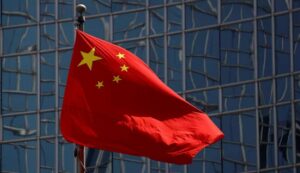China released a Chinese-language white paper discussing the nation’s security direction
Hong Kong: A white paper outlining the country’s security strategy was published in Chinese by the State Council Information Office on May 12. Beijing characterizes the present geopolitical landscape as “volatile and stable” in its National Security in the New Era paper. Reading between the lines, nevertheless, it is primarily concerned with the longevity and stability of the Chinese Communist Party (CCP).

Due to President Donald Trump’s unpredictable nature, this document’s publication corresponds with increased regional and global uncertainty, even though it must have been in the works for months. In contrast, it is preferable to see the State Council’s claim that the article “represents a major theoretical contribution from contemporary China to the global community” as a hubristic exaggeration.
However, the white paper is significant since it is the first national security document of its kind in China. According to the State Council, “The move aims to provide a comprehensive explanation of the innovative concepts, practices and achievements in China’s national security efforts and enhance the international community’s understanding of China’s national security.”
But the white paper didn’t succeed if its goal was to reassure. The white paper’s sections on sovereignty, systemic risk management, and ideological resilience demonstrate that China’s national security is more about the CCP’s and its ideology’s survival than Beijing’s efforts to portray itself as a source of stability in the Asia-Pacific. The CCP has direct control over a wide range of areas, including politics, the economy, the military, science and technology, and society, all of which are included in its notion of holistic security. Nontraditional dangers like the internet, AI, biosecurity, and public health are also included in the notion.
It’s interesting to note that it asserts that “people’s security” is the ultimate objective. However, the People’s Republic of China has never been for the people; rather, its purpose is to uphold and celebrate the CCP’s dominance. The statement in the paper that political security is “the fundamental task” confirms this. In addition, the CCP organ said that national security “firmly fulfills the major responsibilities entrusted by the party and the people, upholds the party’s position as the governing party and the socialist system, improves the people’s sense of fulfillment, happiness and security…”
There is a prelude, six parts, and a conclusion in this work.
To give an overview of the contents, the six chapters address the following topics: China bringing stability and certainty to a world of chaos and change; the comprehensive approach to national security directing national security efforts in the new era; offering strong support for the steady and ongoing advancement of Chinese modernization; pursuing development in security and reinforcing security in development; putting the Global Security Initiative into action and advancing global security; and modernizing the national security system and capacity through more extensive reforms.
Since China is now more closed under Xi, it is unclear how national security “supports further expansion of high-level opening up,” as well as how it “operates under the rule of law,” as stated in the white paper. Indeed, China has lately passed new legislation pertaining to counterterrorism, cybersecurity, and data protection, for instance, but it also utilizes these laws to impose population control. Instead of being the rule “of” the law, this is the rule “by” the law.
Four important ideas from the National Security in the New Era White Paper were emphasized by Mathieu Duchatel, Resident Senior Fellow and Director of International Studies at the French think tank Institut Montaigne. The first is the importance of the all-encompassing national security concept that Chairman Xi Jinping initially presented in April 2014. Political, military, territorial, economic, financial, cultural, social, scientific and technological, cyberspace, food, environment, resources, nuclear concerns, foreign interests, deep sea, polar areas, outer space, biology, artificial intelligence, and data are all included in its broad reach. The idea that political security is the new era’s lifeline for national security is the second. Stated differently, the CCP system has to be protected at all costs.
Thirdly, Duchatel draws attention to how national security strategy is framed as promoting modernization in the Chinese fashion. For example, it indicates that China is the third-safest country in the world, with a murder rate of 0.44 per 100,000. China claims that its low crime rate and social peace demonstrate good administration, but in reality, they are more indicative of the severe restrictions put in place in an Orwellian police state where dissent is tightly prohibited.
Duchatel claims that the fourth idea is the pursuit of equilibrium between development and national security objectives. The CCP argues that increased national security is necessary for the country to grow at a higher level. Thus, it views high-level security and high-quality development as two sides of the same coin. Economic resilience is essential to national stability since the two are interdependent. In order to safeguard itself and reduce its vulnerability to international sanctions or interruptions in global supply lines, China is likewise placing a high priority on technical independence.
“Chinese nation with a profound and rich strategic culture on national security” is a reference to the country’s 5,000-year history in the white paper. In addition to implying Xi’s continuity as if he is expanding upon earlier foundations, this is meant to validate his comprehensive national security doctrine. The CCP really takes the moral high ground in a large portion of this white paper. “In this context, China can be expected to achieve some soft-power gains, even though its actual behavior does not always align with its policy statements and sometimes contradicts them,” Duchatel said, referring to Trump’s disregard for established American and human values. In this study, China focuses on its responsible role in international affairs.
“Building a community with a shared future for humanity and bringing a global outlook to the holistic approach to national security” is the vision of Xi’s 2022 proposal for the Global Security Initiative (GSI). The GSI opposes bloc confrontations while promoting multilateralism and shared security. Stated differently, the goal of the GSI is to replace Western blocs with China as the primary security partner. China can control others from this vantage point.
The white paper said, “China ensures both its own security and common security, advocates strengthening global security governance, practices the global governance concept of extensive consultation, joint contribution and shared benefits, upholds true multilateralism, and works to make the global security governance system fairer and more equitable.” Nevertheless, despite the pretentious rhetoric, the GSI offers no answers to the dilemma that an authoritarian government has when its national security is in conflict with those of other countries. China chooses forceful measures when it feels threatened, as experience has shown.
Particularly with regard to Taiwan, Hong Kong, Xinjiang, Tibet, and maritime rights, China asserts that its sovereignty, territorial integrity, and development interests are non-negotiable. Duchatel said that the tone of the article “clearly favors United Front tactics over military coercion. There is no indication that Beijing is losing patience.” The report promotes the CCP’s “sincerity” in seeking peaceful unification of Taiwan.
It is feared that China’s “national security” initiatives would only serve to increase its power and influence abroad while also tightening restrictions over its own territory. After all, China might argue that it is only exercising legitimate national security anytime it exercises control over others. Another example of the contradictions in this white paper is that, in spite of China’s unwavering support for Vladimir Putin’s invasion, the text advocates for a political solution to the Ukraine conflict.
“The document presents a posture of benevolent neutrality, repeating, for example, the line that ‘the sovereignty and territorial integrity of all countries should be respected,’ even though China has played a crucial role in facilitating Russia’s invasion of Ukraine,” Duchatel said. Even if many nations are unaware of it for many reasons, including anti-American ideology, whataboutism, or a lack of knowledge about China, the gap between narrative and policy continues to be a significant flaw in China’s foreign policy. ” The way China treats India and Pakistan presents the same conundrum.
Despite its rhetorical condemnation of the terrorist act in Pahalgam, it supports and equips Pakistan, as shown by the employment of its weaponry in a brief but brutal cross-border conflict. Recently, American foreign policy researcher Ryan Hass, director of the John L. Thornton China Center at the Brookings Institution, traveled in China for 10 days. A few of his findings supported the white paper’s conclusions. According to Hass, “I feel China’s plan for the US-China trade war is coming into focus around three central planks: maintain composure and resolve; avoid being isolated; and hit America where it hurts.”
He went on to explain that the Chinese government is portraying itself as calm and self-assured while also preparing the Chinese people for economic instability. This entails inciting nationalism by citing China’s history of standing hard against outside intimidation and directing the public’s resentment onto the USA as the cause of their issues. Finding shared causes with Asian and other countries is one of Beijing’s many efforts to prevent isolation. “PRC leaders don’t expect a near-term resolution to the trade war,” Hass concluded. They see it as a sign of a larger US plan to stifle China’s ascent. They think that any concessions made by the PRC now would just encourage further pressure from the US. Instead of seeing the current situation as an economic catastrophe, they are viewing it as a strategic challenge.
“Believing that its political system is more cohesive, disciplined, and hardened than the US government to withstand trade war pressure,” said Hass. They are indicating that they will remain steadfast and bide their time until Trump changes his mind. This national security white paper aimed to convey the same type of message: China is projecting an air of confidence while transforming social problems into national security difficulties.

